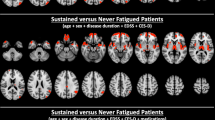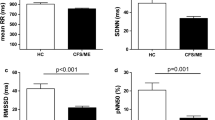Abstract
Elevated body temperature was recently reported for the first time in patients with relapsing–remitting multiple sclerosis (RRMS) relative to healthy controls. In addition, warmer body temperature was associated with worse fatigue. These findings are highly novel, may indicate a novel pathophysiology for MS fatigue, and therefore warrant replication in a geographically separate sample. Here, we investigated body temperature and its association to fatigue in an Italian sample of 44 RRMS patients and 44 age- and sex-matched healthy controls. Consistent with our original report, we found elevated body temperature in the RRMS sample compared to healthy controls. Warmer body temperature was associated with worse fatigue, thereby supporting the notion of endogenous temperature elevations in patients with RRMS as a novel pathophysiological factor underlying fatigue. Our findings highlight a paradigm shift in our understanding of the effect of heat in RRMS, from exogenous (i.e., Uhthoff’s phenomenon) to endogenous. Although randomized controlled trials of cooling treatments (i.e., aspirin, cooling garments) to reduce fatigue in RRMS have been successful, consideration of endogenously elevated body temperature as the underlying target will enhance our development of novel treatments.

Similar content being viewed by others
References
Uhthoff W (1890) Untersuchungen uber die bei der multiplen Herdsklerose vorkommenden Augenstorungen. Arch Psychiatr Nervenkr 21:55–410
Sumowski JF, Leavitt VM (2014) Body temperature is elevated and linked to fatigue in relapsing-remitting multiple sclerosis, even without heat exposure. Arch Phys Med Rehabil 95(7):1298–1302
Schwid SR, Petrie MD, Murray R, Leitch J, Bowen J, Alquist A et al (2003) A randomized controlled study of the acute and chronic effects of cooling therapy for MS. Neurology 60(12):1955–1960
Wingerchuk DM, Benarroch EE, O’Brien PC, Keegan BM, Lucchinetti CF, Noseworthy JH et al (2005) A randomized controlled crossover trial of aspirin for fatigue in multiple sclerosis. Neurology 64(7):1267–1269
Shaygannejad V, Janghorbani M, Ashtari F, Zakeri H (2012) Comparison of the effect of aspirin and amantadine for the treatment of fatigue in multiple sclerosis: a randomized, blinded, crossover study. Neurol Res 34(9):854–858
Krupp LB, LaRocca NG, Muir-Nash J, Steinberg AD (1989) The fatigue severity scale. Application to patients with multiple sclerosis and systemic lupus erythematosus. Arch Neurol 46(10):1121–1123
Téllez N, Río J, Tintoré M, Nos C, Galán I, Montalban X (2005) Does the Modified Fatigue Impact Scale offer a more comprehensive assessment of fatigue in MS? Mult Scler 11:198–202
Téllez N, Río J, Tintoré M, Nos C, Galán I, Montalban X (2006) Fatigue in multiple sclerosis persists over time: a longitudinal study. J Neurol 253(11):1466–1470
Svanborg P, Asberg M (2001) A comparison between the beck depression inventory (BDI) and the self-rating version of the Montgomery Asberg Depression Rating Scale (MADRS). J Affect Disord 64(2–3):203–216
Leavitt VM, Sumowski JF (2015) The Authors Respond. Arch Phys Med Rehabil 96(3):563–564
Pietroboni A, Arighi A, Deriz M, Scarpini E, Galimberti D, Bresolin N et al (2013) Brain temperature in multiple sclerosis. Mult Scler [Epub ahead of print]
Hasan KM, Lincoln JA, Nelson FM, Wolinsky JS, Narayana PA (2015) Lateral ventricular cerebrospinal fluid diffusivity as a potential neuroimaging marker of brain temperature in multiple sclerosis: a hypothesis and implications. Magn Reson Imaging 33(3):262–269
Kohler O, Benros ME, Nordentoft M, Farkouh ME, Iyengar RL, Mors O et al (2014) Effect of anti-inflammatory treatment on depression, depressive symptoms, and adverse effects: a systematic review and meta-analysis of randomized clinical trials. JAMA Psychiatry 71(12):1381–1391
Leavitt V, Sumowski J (2015) Anti-inflammatory intervention in depression. JAMA Psychiatry 72(5):511–512
Author information
Authors and Affiliations
Corresponding author
Ethics declarations
Ethical standards
This study was approved by the ethical review board of University Hospital San Raffaele, Milan. All participants provided written informed consent before enrollment.
Conflicts of interests
VM Leavitt, E DeMeo, and G Riccitelli report no disclosures. MA Rocca received speaker honoraria from Biogen Idec, Sereno Symposia International Foundation, and Novartis and receives research support from the Italian Ministry of Health and Foundazione Italiana Sclerosis Multipla. G Comi has received consulting fees for participating in advisory boards from Novartis, Teva Pharmaceutical Industries Ltd, Sanofi-Aventis, Merck Seronon, Bayer Schering Pharma, Actelion Pharmaceuticals Ltd, and GeNeuro, and lecture fees from Novartis, Teva Pharmaceutical Industries Ltd, Sanofi-Aventis, Merck Seronon, Biogen-Dompe, Bayer Schering Pharma, and Serono Symposia International Foundation. M Filippi is Editor-in-Chief of the Journal of Neurology; serves on scientific advisory boards for Teva Pharmaceutical Industries Ltd.; and has received funding for travel from Bayer Schering Pharma, Biogen Idec, Merck Seronon, and Teva Pharmaceutical Industries. JF Sumowski has received speaker honorarium from Biogen Idec.
Additional information
M. Filippi and J. F. Sumowski contributed equally to the manuscript.
Rights and permissions
About this article
Cite this article
Leavitt, V.M., De Meo, E., Riccitelli, G. et al. Elevated body temperature is linked to fatigue in an Italian sample of relapsing–remitting multiple sclerosis patients. J Neurol 262, 2440–2442 (2015). https://doi.org/10.1007/s00415-015-7863-8
Received:
Revised:
Accepted:
Published:
Issue Date:
DOI: https://doi.org/10.1007/s00415-015-7863-8




